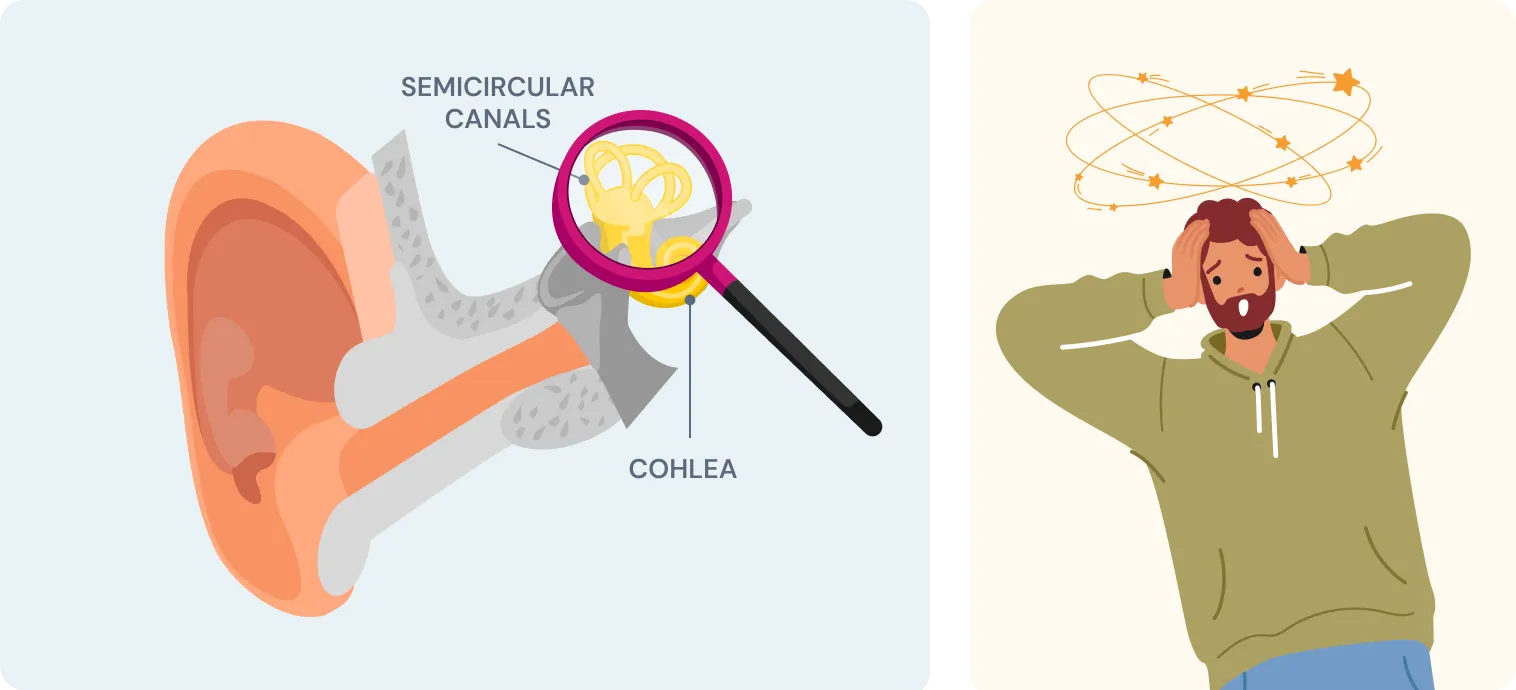Vertigo from GLP-1 injections can show up as light-headedness, a spinning sensation, or a general feeling of unsteadiness, especially in the first few weeks or after a dose increase of medications like semaglutide (Wegovy) or tirzepatide (Mounjaro).
Although it’s not one of the most common side effects, vertigo can be unsettling and may affect your ability to drive, work, or stay active. Fortunately, there are practical ways to manage it. Read on to learn what’s happening in your body and how to ease the symptoms.

What is Vertigo?
Vertigo is more than just feeling dizzy. It’s the sensation that you or your surroundings are spinning or tilting, even when you’re standing still. It can make you feel off-balance, nauseous, or as if the room is moving. Vertigo is a symptom, not a condition itself, and can be triggered by anything that disrupts your inner ear or balance system, including certain medications.
Why Does Vertigo Happen on GLP-1s?
GLP-1 receptor agonists work by slowing digestion, reducing appetite, and helping your body regulate blood sugar. While this can lead to meaningful weight loss and better blood glucose control, it can also trigger changes that make you feel dizzy or off balance—especially early in treatment.
Vertigo and dizziness may be caused by:
- Fluctuating blood sugar as your eating patterns shift
- Dehydration from reduced fluid intake, nausea, or vomiting
- Low blood pressure, particularly when standing up quickly
- Electrolyte imbalances due to dietary changes or fluid loss
- Rapid weight loss affecting your inner ear and balance
- Vestibular effects (your inner ear balance system) as a direct response to medication
These symptoms often occur in the first few weeks after starting GLP-1 treatment or during dose increases. Thankfully, most people find the sensation improves as their body adjusts.
How to Manage Dizziness and Vertigo
If you’re experiencing dizziness or vertigo during GLP-1 treatment, there are simple, practical steps you can take to feel more steady:
Hydration and Nutrition
- Drink at least 2 litres of water per day, sip regularly
- Eat small, regular meals to keep blood sugar stable
- Consider electrolyte drinks if you’ve had vomiting or feel depleted
- Avoid skipping meals, even if your appetite is low
Movement and Positioning
- Stand up slowly from sitting or lying down
- Avoid sudden head movements
- Use support when walking if you feel unsteady
- Ask a physiotherapist about gentle balance exercises
Monitoring and Recovery
- Track your symptoms: note when they occur and what may trigger them
- Monitor blood pressure if you’ve had low readings in the past
- If diabetic, keep an eye on blood sugar levels, especially during titration
- Avoid overheating. Warm environments can make dizziness worse
Important: If your vertigo becomes severe, persistent, or gets worse over time, contact your healthcare provider immediately. Never stop your medication without medical advice.
Typical Timeline for GLP-1 Vertigo
While each person’s experience is different, vertigo symptoms tend to follow a pattern:
- Week 1-2: dizziness may begin as your body adjusts
- Week 2-4: symptoms may peak with dose increases
- Week 4-8: many people begin to feel more balanced
- 8+ weeks: most symptoms improve or resolve completely
When to Seek Medical Advice
Call your GP or pharmacist right away if you experience:
- Severe vertigo that makes it hard to walk or function
- Ringing in the ears or sudden hearing loss
- Episodes that last more than a few hours
- Fainting or blacking out
- Chest pain or difficulty breathing
- Intense headaches with dizziness
FAQs
Is vertigo a recognised side effect of GLP-1 medications?
Dizziness is listed in official prescribing information. Vertigo—a spinning sensation—can occur as part of that and may relate to blood pressure, blood sugar changes, or rapid weight loss.
Will the vertigo go away once my body adjusts?
In most cases, yes. Many people find symptoms ease by weeks 4–8. If they persist, your healthcare provider can help assess and support you.
Can dehydration cause vertigo on GLP-1s?
Absolutely. Dehydration is one of the most common causes. It’s important to drink enough fluids, especially if you’ve experienced nausea or reduced appetite.
Should I stop my injection if the dizziness is severe?
Not without medical advice. Your GP or pharmacist may suggest adjusting your dose or timing—don’t stop your medication on your own.
Are there medications that can help?
Yes, in some cases. Your provider may recommend anti-nausea medication or treatments used for motion sickness or vertigo while your body adjusts.
How do I know it’s the GLP-1 and not something else?
If your symptoms started shortly after beginning treatment or during a dose change, it’s likely linked. But always speak to a professional—other conditions, like inner ear issues, can cause similar symptoms.
Related
- Bloating from GLP-1 Injections
- Common GLP-1 Weight-loss Side Effects
- Constipation from GLP-1 Injections
- Dehydration from GLP-1 Injections
- Diarrhoea from GLP-1 Injections
- Dry Mouth from GLP-1 Injections
- Fatigue from GLP-1 Injections
- Flatulence from GLP-1 Injections
- Hair loss from GLP-1 Injections
- Headaches from GLP-1 Injections
- Injectable Weight Loss Treatments (GLP-1)
- Nausea & Vomiting from GLP-1 Injections
- Sulphur Burps from GLP-1 Injections (Mounjaro, Wegovy): How to Manage Them
- Vertigo from GLP-1 Injections
- Obesity
- Weight Loss



























